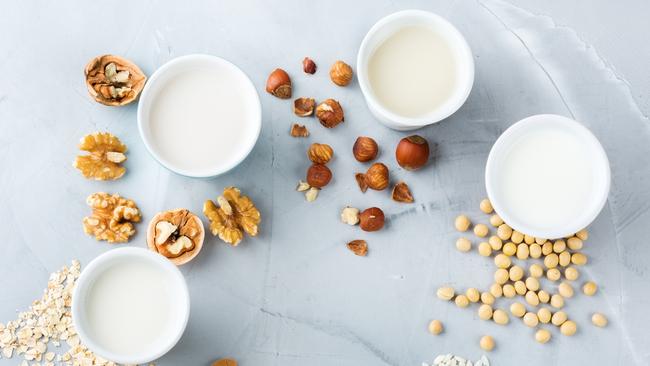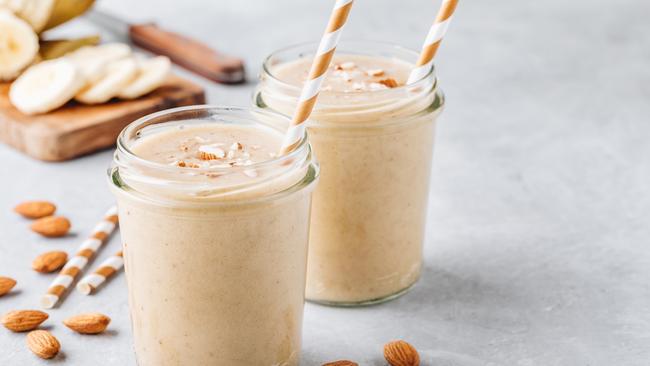Oat milk – it’s trendy, but not as healthy as you think
Sales of oat milk have doubled in a year, but most commercial substitutes for cow’s milk lack its key nutrients.

Are you getting your oats? Not so long ago, porridge, oat cakes and flapjacks formed the full extent of the average oat food menu, but now it is unusual to meet friends for coffee without at least one opting for oat milk in their coffee. The mulched oat milk alternative, made by soaking oats in water and then blending it, tastes a bit like the liquid left in a porridge bowl. Nonetheless it has us hooked.
In 2020 Waitrose reported that online searches for “oat milk” were up 210 per cent on the previous year, with sales of oat milk drinks up 113 per cent. The data firm Nielsen reports that UK oat milk sales more than doubled to pounds 73 million last year.
Oprah Winfrey, Jay-Z and Natalie Portman are among the backers of Oatly, a commercial oat milk brand recently floated on the Nasdaq stock exchange in New York. The company, valued at nearly 10 billion pounds, plans to open one of the largest plant-based factories in the world in Peterborough in 2023; it will have the capacity to produce up to 450 million litres of oat milk a year.
Such is the hipster popularity of oat milk that an entire oat industry has grown in its wake. Oatly has rolled out an oat-based cheesy spread and creamy “oatgurts”, while Alpro has launched Daily Immunity Support oat milk with echinacea to boost your immune system. Taco Bell has introduced Pulled Oats, a plant-based filling made from oats, fava beans and yellow peas, to its UK restaurants and Gold&Green, the Helsinki-based brand that developed the product, also makes Deli OatBites and oat balls to top your spaghetti.

Those of you with a sweet tooth might be tempted by Halo Top’s oat milk Caramel Chocolate Pretzel ice cream or Oatly’s whippable vanilla custard. Wash it all down with a glass of oat wine or Nescafe’s Gold non-dairy oat latte made with coffee and oats, and a square or two of James Cadbury’s HiP range of oat-milk chocolate bars or Lindt’s vegan Hello chocolate bars, which come in three flavours – cookie, hazelnut, and salted caramel – all made with oat milk.
It’s a far cry from Ready Brek, but are oats really the plant-based answer to our health woes? “Oats are a whole grain and an excellent source of fibre, B vitamins, vitamin E and magnesium,” says Anita Bean, a registered nutritionist and the author of The Vegan Athlete’s Cookbook. “But that’s not to say that we always eat them in a way that is healthy.”
Add too much sugar and salt to your oats and it will offset most of the health gains that come from eating them. “They are a great addition to the diet in their most natural state,” Bean says. Here’s how to get your oats:
Are oats gluten free?
Oats contain avenin, a protein similar to gluten, which, according to the charity Coeliac UK, means they can cause sensitivities in a small percentage of people with coeliac disease. For most people with the condition or a gluten intolerance, choosing gluten-free oats is a solution, although finding them isn’t always easy and you need to check labels carefully. Many standard oats are produced in the same factories as wheat, barley and rye with a potential risk of gluten contamination.
“Just because a product is labelled as ‘100 per cent oats’, ‘pure oats’ or ‘organic oats’ does not mean they are gluten-free,” Bean says. Only oat products clearly labelled as gluten free will have been tested to make sure they contain 20 parts per million or less of gluten to meet legal standards for gluten-free labelling.

Instant oats v regular porridge
Not all oats are equal and the way they are processed influences how they affect your blood sugar. Steel-cut oats are the least processed, but have a tough texture that requires a cooking time of 20 minutes or longer to make them digestible. Old-fashioned rolled oats, most commonly used to make porridge, are the result of oat kernels (or groats) being steamed, then rolled into flat flakes, a process that stabilises the healthy oils in the oats, so they stay fresh for longer.
At the other end of the scale are instant oats, which are also partially cooked by steaming, rolled even thinner than regular rolled oats, then cut using steel cutters to produce a fine grain. They cook within a few minutes, but are regarded as an ultra-processed food and have been shown to cause unhealthy rises in blood sugar. Chronically elevated blood sugar is associated with weight gain, and being overweight carries a greater risk of developing type 2 diabetes and heart disease.
“The more finely ground the oats, the bigger impact on blood sugar levels after you eat them,” Bean says. “Instant oats are not a good option as they are so highly processed, and steel-cut oats followed by rolled oats are a better option to prevent these sharp blood sugar swings.”
How healthy is oat milk?
It may be fashionable, but oat milk lacks the nutrients naturally present in cow’s milk, including calcium, potassium, phosphorus and iodine, along with the vitamins B2 and B12. Some – but not all – oat milks are enriched with vitamins and minerals, but if you make your own or select one that is not fortified you risk missing out.
Of particular concern is a lack of iodine, a trace mineral that’s important for healthy thyroid function and fertility. Cow’s milk products provide 34 per cent of the UK’s iodine intake – a 200g glass provides about 70mcg of the mineral, almost half the adult recommended daily intake of 150mcg (it’s 200mcg a day for pregnant and breastfeeding women).
For a study published in the British Journal of Nutrition, Margaret Rayman, professor of nutritional medicine at the University of Surrey, compared the iodine content of milk alternatives, including six varieties of oat milk, with cow’s milk and found that iodine and nutrient levels varied considerably. “If you want to drink oat milk, look for one that is fortified with iodine, calcium and preferably also vitamin B12 and vitamin D,” she says.
Some commercial oat milks are sweetened and all are lower in protein than cow’s milk. “If you don’t eat dairy, you will need to find protein sources other than oat milk to add to your diet,” Bean says. “Tofu, tempeh and nuts are all good sources.” Great claims are often made about the fibre content of oat milk, but it is not impressively high. An average serving of a commercial oat milk provides 2g of fibre, less than 10 per cent of the daily requirement for adults (30g).

Are oats good for the gut?
Dr Megan Rossi, a research fellow in nutrition at King’s College London, says oats provide a welcome boost for gut health. “They are a great source of beta glucan, a type of soluble fibre that dissolves inside the digestive tract,” she says.
“It has prebiotic properties and helps good bacteria to flourish in the gut.” Scientists at the APC Microbiome Ireland SFI Research Centre in Cork found that oat beta glucan benefited the gut microbiome and increased good bacteria in the gut. “The message is to take porridge regularly to protect your gut microbiota,” says Professor Catherine Stanton, the head of research at the APC and the paper’s author.
Will they help you lose weight?
Oats contain about 380 calories and about 7g of unsaturated fat per 100g, and a bowl of porridge made with 200ml semi-skimmed milk provides about 280 calories. They are not particularly low in calories, but have been shown to help weight loss in other ways. A review by Louisiana State University scientists found that regular consumption of oats releases satiety hormones that help to keep appetite under control.
The greatest effects are seen with steel-cut or rolled oats, although studies show that even instant oats have a greater effect on satiety than other oat-based breakfast cereals. “Having porridge made with oat milk for breakfast will provide a little more of the beneficial fibre that stalls hunger,” Bean says. “It should see you through to lunchtime without a snack attack.”
Will eating porridge help your heart health?
A bowl of porridge each day was hailed as a step towards heart protection by the Harvard University authors of a review of 12 studies involving 786,076 participants. All participants were healthy when they enrolled for the trial, but a follow-up after 16 years showed that more than 26,000 had since died. Those who ate the most whole grains, including porridge, seemed better able to ward off heart disease, and eating 70g whole grains, equivalent to a bowl of porridge, a day reduced heart deaths by about 20 per cent.
In her studies at Cork, Stanton also showed that oat fibre helped to lower blood cholesterol and reduce the risk of heart disease. “To help heart health you should aim to eat around 3-4g of beta glucan each day,” the nutrition therapist Ian Marber says. “That would be the equivalent of a small bowl of unsweetened porridge and three sugar-free oatcakes daily.”
Can oats boost your gym performance?
Porridge or overnight oats have long been the favoured breakfast of elite athletes, from Jessica Ennis-Hill and Andy Murray to Eilish McColgan and Paula Radcliffe, for a reason. “It is an ideal source of slow release, low glycaemic index carbohydrates that will top up glycogen stores – carbohydrate storage in the muscle and liver – that become low overnight, and it provides a long-lasting energy release that will keep you going in sport,” Bean says. “I’d go as far as to say oats are the perfect pre-exercise food for anyone.”
Porridge made with milk also provides the essential amino acid lysine, while a 2020 study showed that baked oat-based cereals do not. “Lysine is an important trigger for muscle growth and development,” Bean says. “Your body can’t make it and you need it from food.”
The Times







To join the conversation, please log in. Don't have an account? Register
Join the conversation, you are commenting as Logout